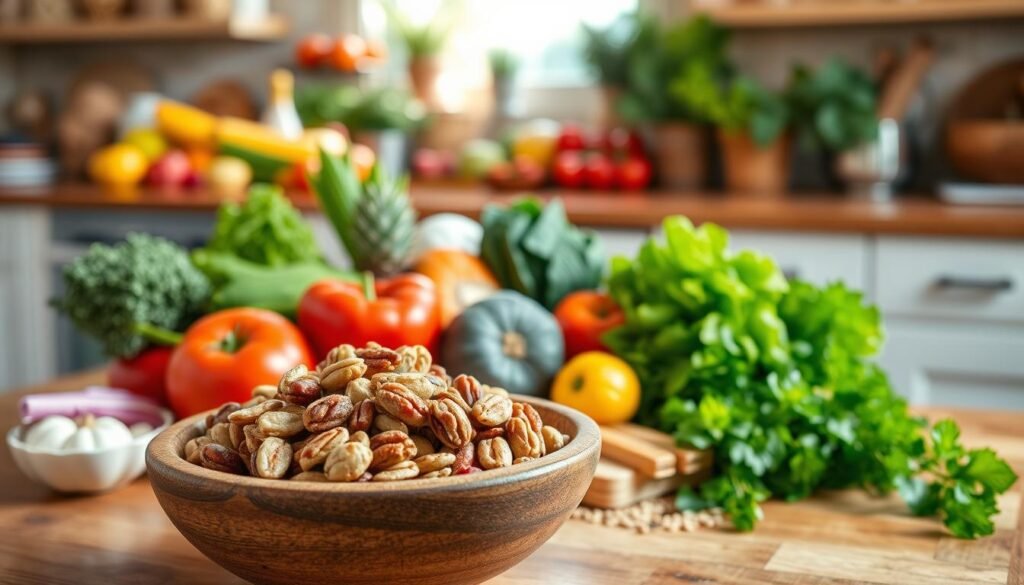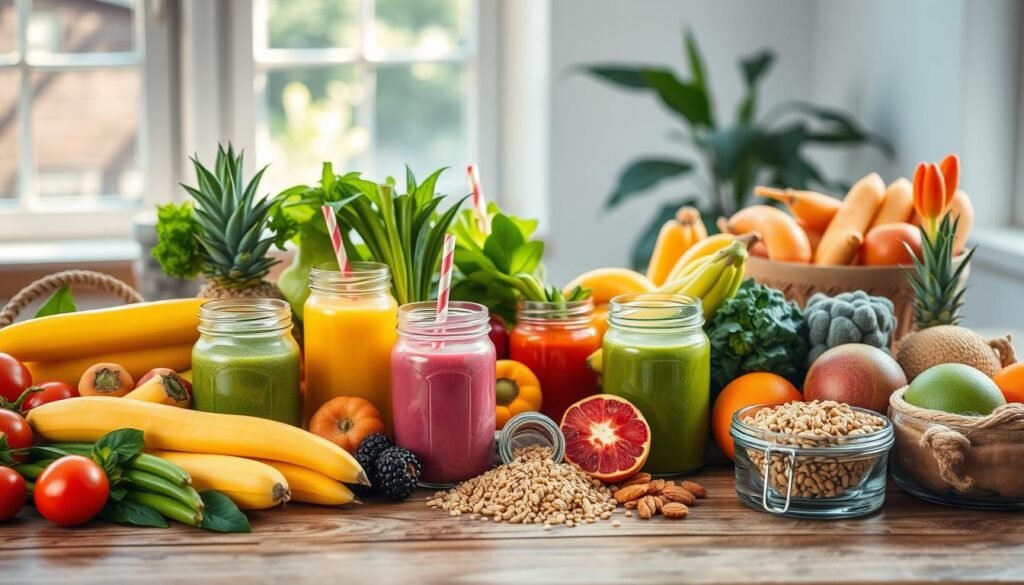Reflecting on my health journey, I’m grateful for the impact of good nutrition and exercise. For years, I felt tired, craved food often, and lacked motivation for exercise. Learning about fitness nutrition changed everything for me, both physically and mentally.
I’m excited to share my knowledge with you. This guide will help you build a balanced lifestyle. It will nourish your body, fuel your fitness goals, and boost your overall well-being. Let’s start our journey to better health and unlock endless energy and vitality through fitness nutrition.
Key Takeaways
- Understand the foundations of whole food nutrition for better health
- Identify and eliminate inflammatory foods that may be hindering your progress
- Discover the science behind optimal macronutrient balance for fitness performance
- Learn strategies for creating a balanced meal plan to support your active lifestyle
- Explore the role of nutrient timing and smart supplementation to fuel your workouts
Understanding the Foundations of Whole Food Nutrition
Whole food nutrition focuses on eating foods in their natural state. It emphasizes clean eating to nourish the body and support health. By avoiding inflammatory foods, we can improve our well-being and lower the risk of chronic diseases.
The Role of Clean Eating in Health
Clean eating means choosing whole, unprocessed foods. These foods are packed with vitamins, minerals, and antioxidants. They help us stay healthy and avoid processed items linked to health problems.
Identifying Inflammatory Foods
Some foods can cause inflammation, leading to health issues. For example, obesity increases the risk of type 2 diabetes and sleep apnea. Limiting these inflammatory foods helps protect our health.
Bio-individuality in Nutrition
Everyone’s nutritional needs are different, thanks to bio-individuality. What’s good for one person might not be for another. It’s key to listen to your body and adjust your diet to meet your needs. Eating a variety of foods supports gut health and prevents chronic diseases.
“Cutting back on ultra-processed foods can protect against diseases and promote physical and mental well-being.”
| Nutrient-Dense Foods | Inflammatory Foods |
|---|---|
| Fruits, vegetables, whole grains, lean proteins, healthy fats | Refined carbohydrates, processed meats, fried foods, sugary drinks |
| High in vitamins, minerals, and antioxidants | Linked to increased risk of chronic diseases |
| Support overall health and well-being | Contribute to inflammation and negative health outcomes |
The Science Behind Fitness Nutrition
Understanding sports nutrition is key for top performance and health. It’s all about macronutrients like proteins, carbs, and fats. They help with workouts and muscle growth.
For elite athletes or those working out a lot, special diets might be needed. But most people don’t need extra calories for short workouts. Activities like yoga, running, or weight training usually don’t require more food.
Nutrient timing is vital for better workouts and recovery. Pre-workout nutrition gives energy for exercise. Post-workout recovery helps with muscle repair and energy replenishment.
Calorie tracking is also important in fitness nutrition. It helps manage weight and support athletic goals. Whether it’s losing weight, gaining muscle, or improving health, it’s all about balance.
“Eating right for an exercise regimen is less about calculating certain proportions of protein, fat, and other micronutrients in the diet and more about eating healthy, whole foods.”
The science of fitness nutrition is about balance. It’s about the right mix of macronutrients, timing, and calorie tracking. This supports an active lifestyle and peak performance.
Essential Macronutrients for Optimal Performance
To reach top fitness and performance, knowing about macronutrients is key. These are the big three: protein, healthy fats, and complex carbs. Each one is vital for our health and how well we do in sports.
Quality Protein Sources
Protein is super important for athletes. It helps fix and grow muscles, and aids in recovery. Good protein sources include lean meats, fish, eggs, dairy, and legumes. Also, soy and quinoa are great for those who don’t eat meat.
Endurance athletes need 0.5 to 0.6 grams of protein for every pound of body weight. Strength athletes should aim for 0.7 to 0.8 grams per pound.
Healthy Fats and Their Benefits
Healthy fats are not just good; they’re essential. They give a lot of energy, help absorb nutrients, and keep blood sugar steady. Athletes should eat 25 to 30% of their calories as fat.
Focus on unsaturated fats from nuts, seeds, avocados, fatty fish, and oils. These are the best sources.
Complex Carbohydrates for Energy
Carbs are the body’s main energy source. They’re key for lasting energy during workouts and daily life. Athletes should eat 2.5 to 3 grams of carbs for every pound of body weight for regular training.
For endurance athletes, aim for 3 to 4.5 grams per pound. Focus on whole grains, fruits, and veggies for your carbs.
By balancing these macronutrients, athletes can fuel their bodies right. This helps them perform at their best, recover well, and stay healthy.
Creating a Balanced Meal Plan
Making a balanced meal plan is key to reaching your fitness goals and staying healthy. It’s important to eat a variety of foods from all groups. This way, your body gets the vitamins, minerals, and nutrients it needs.
Start by using the USDA’s MyPlate guidelines. Fill half your plate with fruits and veggies, a quarter with whole grains, and the last quarter with lean proteins. Don’t forget to add healthy fats like avocados, nuts, and olive oil for energy and wellness.
Meal prepping can really help you stick to a balanced diet. Spend some time on weekends planning and preparing meals for the week. This saves time during the week and keeps you eating healthy. Try out healthy recipes and meal prepping ideas, like sheet-pan dinners and bowls.
Keep in mind, a balanced diet is personal. Think about what you like, any dietary limits, and how active you are. With some creativity and effort, you can make tasty, healthy meals that help you stay fit.

“The key to a healthy, balanced diet is variety. Enjoy a wide range of foods from all the food groups to ensure your body gets the nutrients it needs.”
Nutrient Timing and Workout Performance
Getting the right nutrients at the right time is key for better workouts and recovery. Eating the right foods before, during, and after exercise helps fuel your body. It also supports muscle growth and boosts fitness. Let’s dive into the best ways to eat before and after working out, and how to stay hydrated.
Pre-workout Nutrition
Before you start exercising, make sure you have enough energy. Eat a meal or snack rich in complex carbs for steady energy. Add some protein to help your muscles last longer and avoid getting tired. This balanced diet helps you perform better and go harder in your workouts.
Post-workout Recovery Fuel
Right after you exercise, your body is ready to soak up nutrients. This is the best time to refill your energy and start healing. Mix high-quality protein with quick carbs to help your muscles grow back and your energy stores refill. Aim for a 1:2 or 1:3 protein-to-carb ratio in your post-workout meal or shake.
Hydration Strategies
- Drink plenty of water before, during, and after your workout.
- Drink 16-24 ounces of water 2-4 hours before your workout.
- Use a carb-electrolyte drink during your workout to replace lost fluids and salts.
- Keep hydrating with water or a recovery drink after your workout to refill your fluids.
By following these tips, you can improve your workout performance, aid in muscle recovery, and stay hydrated. Remember, consistency is important. Make nutrient timing a big part of your fitness and nutrition plan.
Smart Supplementation Strategies
A balanced diet is key to a healthy lifestyle. But, supplements can help support your fitness goals. Learn about sports nutrition supplements and how to use them in your workout routine.
Protein Powders for Muscle Building
Protein supplements like whey, casein, and plant-based options are great for meeting protein needs. They’re easy to use, perfect after hard workouts. Choose high-quality, tested products for the best results.
Creatine for Improved Performance
Creatine is a proven supplement for better exercise performance. It boosts your ability to do intense workouts. Taking 5-25 grams a day for 3-28 days can really help.
Vitamins and Minerals for Recovery
Vitamins C, D, and B-complex, along with minerals like iron and magnesium, aid in recovery. They’re important for your health. Talk to a doctor to find out what you need.
| Supplement | Potential Benefits | Precautions |
|---|---|---|
| Protein Powders | Muscle building, post-workout recovery | Avoid products with artificial sweeteners or fillers |
| Creatine | Improved exercise capacity, high-intensity performance | Consult a healthcare professional before use |
| Vitamins and Minerals | Support recovery, overall health | Ensure proper dosage and timing |
Remember, supplements are not a replacement for a healthy diet. Always talk to a healthcare professional before starting any supplements. They can guide you on the right products and amounts for your needs.
“The true beauty of sports nutrition lies in the synergy between whole foods and targeted supplements, empowering athletes to reach their full potentials.
Weight Management Through Nutrition
Effective weight management is key in fitness nutrition. Learning about calorie balance helps us take steps towards lasting weight loss. It’s about eating fewer calories than we burn, through diet and exercise, for slow but steady weight loss.
Calorie Balance Principles
To keep a healthy weight, focus on calorie balance. The Centers for Disease Control and Prevention (CDC) suggests losing 1–2 pounds a week. This is done by eating fewer calories than we burn, creating a calorie deficit.
Portion Control Methods
Controlling portions is vital for weight management. The National Institutes of Health (NIH) says to eat a variety of foods like fruits, veggies, whole grains, lean proteins, and healthy fats. Stay away from refined carbs, added sugars, and unhealthy fats to help with weight loss.
Sustainable Weight Loss Approaches
Sustainable weight loss is more than quick fixes. The CDC recommends at least 150 minutes of moderate exercise weekly, like brisk walking. A 2018 study also showed that managing stress helps with weight loss. Talking to a healthcare professional can help create a plan for lasting weight management.
“The key to successful weight management is to create a calorie deficit through a combination of a balanced diet and regular physical activity.”
By learning about calorie balance, using portion control, and adopting sustainable weight loss methods, you can manage your health and reach your fitness goals.
Building Healthy Eating Habits
Creating lasting healthy eating habits is essential for fitness and nutrition success. It’s not about strict diets or deprivation. Instead, it’s about adopting a balanced, mindful food approach that fits your lifestyle. By making gradual, lifestyle changes, you can build habits that support your health and well-being.
Mindful eating is key to healthy habits. It means eating fully present, enjoying each bite, and listening to your body’s hunger and fullness signals. Avoid distractions like screens and rush through meals. This way, you can appreciate your food’s flavors and textures, helping you avoid overeating and make better choices.
Meal planning is also vital for healthy habits. Planning your meals and snacks ensures you have nutritious options and avoids unhealthy choices. It saves time and money too, as you can prepare meals in advance and reduce waste.
Remember, building healthy eating habits is a journey, not a goal. Start with small, sustainable changes and be patient. Celebrate your successes and don’t be too hard on yourself when you make mistakes. With the right mindset and strategies, you can develop a lifelong, healthy relationship with food.
“The journey of a thousand miles begins with a single step.” – Lao Tzu
Overcoming Common Obstacles
Creating healthy eating habits can be challenging. Here are tips to overcome common obstacles:
- Emotional eating: Find healthier ways to deal with stress, like exercise, journaling, or talking to a friend.
- Dining out: Choose healthier options like grilled proteins, vegetables, and whole grains before you go.
- Lack of time: Meal prep and batch cooking save time and prevent unhealthy quick fixes.
- Cravings: Enjoy small treats occasionally, but don’t let them ruin your progress. Choose healthier alternatives.
Be patient, persistent, and kind to yourself when building healthy eating habits. With the right mindset and strategies, you can achieve a balanced, sustainable nutrition approach that supports your health and fitness goals.

| Habit | Recommendation | Benefit |
|---|---|---|
| Eating Pace | Slow down and chew thoroughly | Promotes satiety, prevents overeating |
| Portion Control | Use smaller plates, listen to hunger cues | Helps maintain a healthy calorie intake |
| Meal Planning | Prepare meals and snacks in advance | Ensures access to nutritious options |
| Mindful Eating | Eliminate distractions, savor each bite | Fosters a positive relationship with food |
Conclusion
As we wrap up our exploration of fitness nutrition, it’s clear that a balanced approach is key. We’ve covered the basics of whole food nutrition and the science behind fitness diets. We’ve also talked about the role of macronutrients, timing, and supplements.
Now, you know how to make a meal plan that supports your fitness goals and health. Fitness nutrition isn’t about strict diets or extreme measures. It’s about eating wholesome foods, staying active, and finding balance in life.
Remember, the strategies we’ve shared are meant to be flexible. They help you make lasting changes for your health and fitness. As you move forward, keep trying new recipes and finding what works for you.
By embracing a balanced approach to fitness nutrition, you’ll reach your physical goals and live a healthier life. Let’s keep working towards a fitter, more vibrant future together.





you are truly a just right webmaster. The web site loading speed is incredible. It sort of feels that you’re doing any unique trick. Moreover, The contents are masterwork. you have done a fantastic job on this topic!